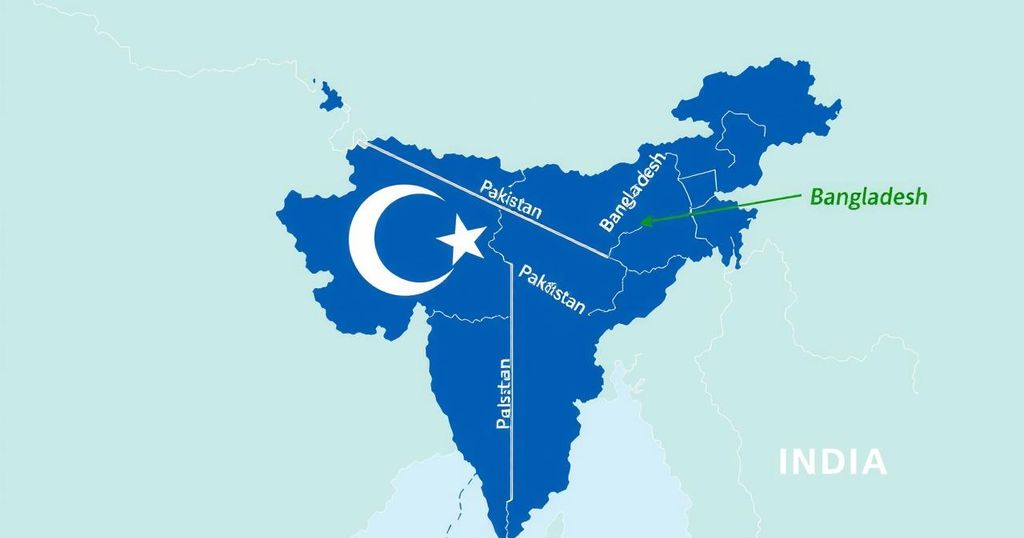Pakistan and Bangladesh: A New Chapter in Bilateral Relations Amidst Historical Shadows

The political shift in Bangladesh after Prime Minister Sheikh Hasina’s ousting has led to a revival of relations with Pakistan, marked by trade agreements and military interactions. This change poses a potential strategic alignment against India, which remains concerned about the implications for regional stability. Unresolved historical issues continue to challenge the normalization of ties between Bangladesh and Pakistan.
The evolving political landscape in Bangladesh, following the ousting of Prime Minister Sheikh Hasina, has led to unexpected reconciliations, particularly with Pakistan. Recently, Dhaka commenced trade with Islamabad, beginning with an import of 50,000 tonnes of rice. In addition to trade, direct flights and military contacts have resumed, while visa processes have been streamlined, indicating a renewed cooperative spirit between the two nations.
Historically, the connection between Bangladesh and Pakistan is complex, marred by conflict dating back to 1971 when Bangladesh sought independence from Pakistan, supported by India. While relations were relatively cordial from 2001 to 2006, Hasina’s tenure from 2009 distanced Bangladesh from Pakistan due to her close ties with India. However, following her recent departure amidst protests, there appears to be a shift towards normalizing relations.
Humayun Kabir, a former Bangladeshi diplomat, notes that the relationship is gradually becoming more amicable. The developments have piqued India’s interest, given its longstanding adversarial history with Pakistan. Since Hasina’s removal, India’s relations with Dhaka have soured, notably regarding unfulfilled extradition requests related to accusations against Hasina.
Some experts view the warming ties as a strategic maneuver. Ayesha Siddiqa, a Pakistani academic, observes that “Pakistan and Bangladesh have a tactical relationship at the moment” aimed at countering Indian influence. The growing military partnership also reflects this shift, as Bangladesh has engaged in military discussions and exercises with Pakistan.
Veena Sikri, former India’s high commissioner to Bangladesh, describes the increasing closeness between the nations as familiar, citing historical concerns regarding insurgent training and support alleged to have come from Pakistan. The porous India-Bangladesh border complicates security but the Bangladeshi government has previously curtailed insurgency activities.
The rekindling of military ties raises security alarms in India. Sikri emphasizes that Pakistan’s renewed relationships with Bangladeshi Islamist parties add another layer of concern. Amidst these tense developments, the Yunus administration firmly denied reports of ISI officials operating within Bangladesh, along with accusations of new collaborations to support Indian insurgent factions.
Analysts assert that despite political tensions, Bangladesh’s close relationship with India inhibits any extreme anti-India posturing. Concerns surrounding the 1971 war, including demands for an apology from Pakistan for historical atrocities, remain unresolved obstacles. Kabir argues that Pakistan must acknowledge its past actions to pave the way for improved relations.
Conversely, former Pakistani military officer Ikram Sehgal insists that both sides must address grievances from the independence struggle, including violence against the Urdu-speaking populace. Economically, focusing on enhancing bilateral trade offers a pragmatic path forward, as past hostility has hindered current trade levels, which total under $700 million. Scholars like Sabrin Beg underline the potential for growth with an eye towards collaboration in trade and improved political relations.
As Pakistan’s foreign minister prepares to visit Dhaka, upcoming elections in Bangladesh could redefine the diplomatic landscape. Enhanced stability in Bangladesh is paramount for India, as it plays a crucial role in the regional peace and security architecture.
In summary, the developing relationship between Bangladesh and Pakistan presents significant implications for regional dynamics, particularly from India’s perspective. The thawing ties, highlighted by resumed trade and military interactions, reflect a strategic pivot that could reshape political alignments. Yet, unresolved historical grievances remain a critical barrier. Future diplomatic engagements will be crucial in determining the trajectory of these relationships and their impact on India’s security concerns.
Original Source: www.bbc.com








